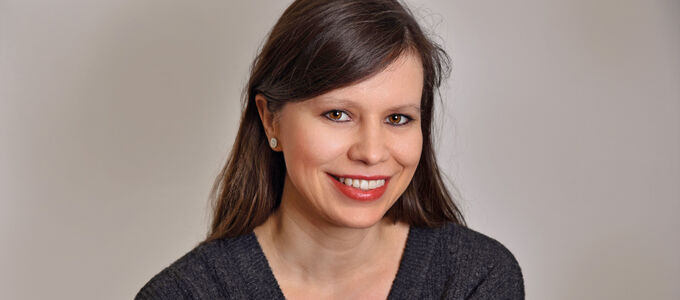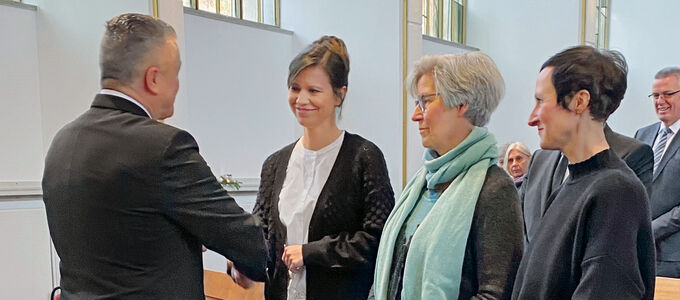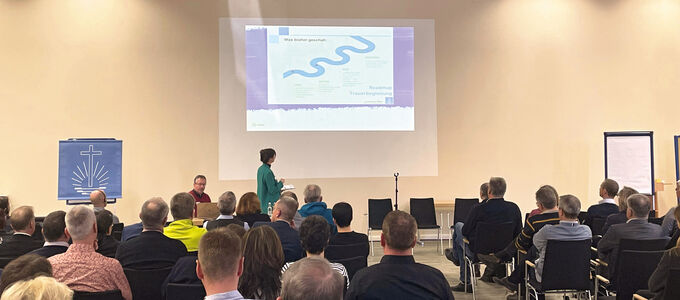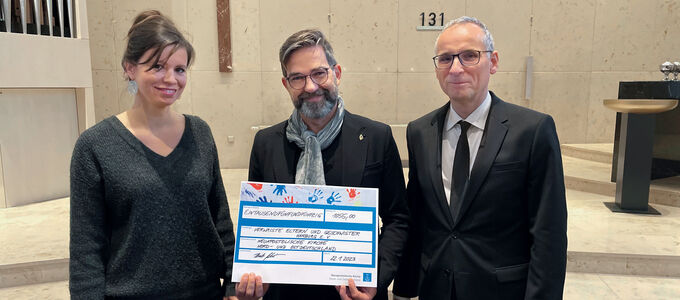“Grief is not the problem, it is the solution”
Grief needs space. And the bereaved need support. What can be done and how can we help? An interview with Brit Gardemeier, spokesperson of the Round Table Bereavement Support Group of the New Apostolic Church Northern and Eastern Germany, provides some insight.
Since the end of last year you have been volunteering your services as grief counsellor in your Regional Church. Is this what you do professionally?
Yes. I have a private practice in music, grief counselling, and psychotherapy in northern Germany. I am a trained bereavement counsellor certified by the German Federal Association of Bereavement Counselling and as such I mainly care for families, with a focus on orphaned parents and grieving siblings.
What motivates you to commit yourself in this field also in the Church?
I stand behind my Church and my faith. Grief counselling, especially the topic of deceased children, is a heartfelt concern, both professionally and in our Church. So I volunteered as a grief counsellor in the Church. In my professional life I experience that the topic of death is often still a side issue in society. I would therefore like to create greater public awareness and help for the bereaved.
What is grief?
A definition that I value very much is: “Grieving is the natural reaction to the loss of a person (or an animal or a thing) with whom there was a meaningful relationship. Grief is not the problem, it is the solution.”
Grief is not something static, but an individual, multi-layered process, which is an overwhelmingly personal experience for each person. It can also be culturally different and can impact our emotions, cognition, the body, and social contacts. Grief is a process of the soul to comprehend what has happened, a universal human reaction that requires expression, space, and time.
What forms of grief counselling are offered in your Regional Church?
Currently there are offers such as individual counselling conversations or a bereavement café, we offer walks, discussion circles for open and closed groups, by e-mail or telephone contact, through home visits, personal consultation hours, various online formats, mourning devotions, as well as offering events on the World Day of Remembrance for Deceased Children.
What can the members expect from the bereavement counsellors?
An open heart and ear, someone who is there for them, and appreciation and respect because grief counselling is pastoral care, that is, relationship building. The grief counsellors are specially trained or are even qualified in the field of grief counselling, so they have a special view on and competence for grief.
What was your personal trigger to go into grief counselling?
There were many moments that led to this and still lead to this. Through many cases of illness and death and many deathbeds that I sat at as a child, I have gained an ultimately natural way of dealing with such important aspects of life as parting, death, and mourning.
Certainly part of the trigger is the fact that my child and I almost died due to pregnancy complications. So for personal reasons I have a special connection to premature and deceased children, to life, to death, and all the wonderful things in between.
Are one’s own experiences of loss a prerequisite for going into grief counselling?
Assuming that everyone has already experienced losses in their lives, dealing with them is certainly a prerequisite. Among other things, I consider a confrontation with one’s own learning and grief biography as well as a readiness for reflection and self-awareness to be important in order to be active in grief counselling.
What other qualities are advantageous for a grief counsellor?
Mental resilience as well as respect for people with different world views and lifestyles are important. In our policy we list empathy, communication skills, ability for self-reflection, and empathy in dealing with mourners. We also consider a qualification in bereavement counselling in an honorary or professional capacity desirable. Therefore, further training, supervision, as well as the official appointment are central points of our policy.
How can one use the resources that one’s faith provides in helping people cope with grief?
Both professionally and in the work in the Church, and also very personally, I experience that faith can be an enormous resource in coming to terms with loss. But the loss initially obscures the direct view of it. At first, the pain of loss and the desire to have the loved one back are huge. Later, people will find their personal spiritual experiences of faith within themselves. In conversations, it is often a matter of first allowing doubts to stand. Therefore, saying things such as “We have such a beautiful faith, there is really no need to be sad,” are simply inappropriate—unless this sentiment is expressed by the bereaved themselves. Yes, faith is beautiful, but it should not be reinterpreted to suppress grief. It is good to listen to the questions and feelings of the bereaved. Especially in the long-term course of accompanying the grieving, faith can strengthen.
Would you encourage others to get involved in the congregation as grief counsellors?
With all my heart, yes.
The full interview was originally published in the German magazine Unsere Familie, issue 12/2023.
Article info
Author:
Date:
Keywords:
Dinara Ganzer
14.08.2023
Social commitment,
Congregational life















